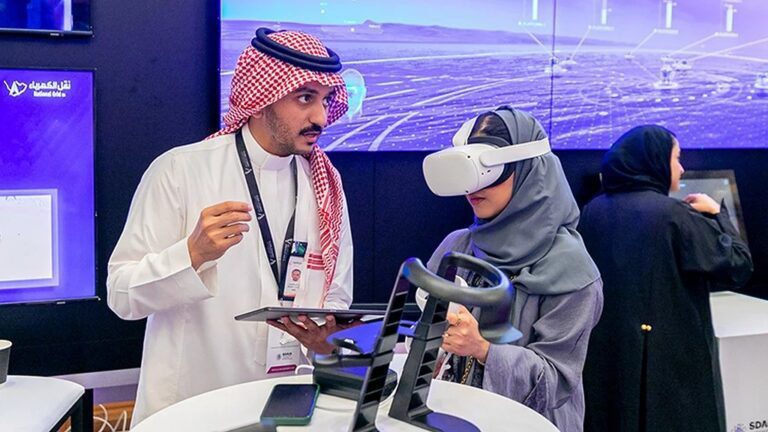- Saudi executives agree that leveraging AI agent ecosystems will be a significant opportunity for their organization in the next 3 years
RIYADH, Saudi Arabia – New research from Accenture (NYSE: ACN) finds the world is in the midst of a massive technology shift, as AI and other disruptive technologies become “Human by Design”—much more human-like and intuitive for people to use— and usher in a new era of unprecedented productivity and creativity.
The research further suggests that as human-centric technologies wield even greater capabilities, are easier to interact with and become even more seamlessly embedded across every aspect of lives, people are moving toward a world where the technology around them will become more omnipresent, yet also more invisible.
Accenture’s Technology Vision 2024: “Human by Design: How AI Unleashes the Next Level of Human Potential” explores how after years of exponential innovation, technology—especially generative AI—is becoming more human.
And as technology evolves to be more human-centric, it drives substantially greater capabilities for people to amplify their potential and reinvent business as we know it.
Unleashing the Potential of Generative AI: Transforming Industries and Redefining Human Capabilities
According to Accenture research, generative AI has the potential to impact 44% of all working hours across industries, enable productivity enhancements across 900 different types of jobs and create $6 to $8 trillion in global economic value.
“As AI, spatial computing and body-sensing technologies evolve to a point where tech appears to imitate human capabilities and seem invisible, what you’ll see left are the people – empowered with new capabilities to accomplish things they once considered impossible,” said Paul Daugherty, chief technology and innovation officer at Accenture.
“This important seismic shift in the way people work, live and learn will accelerate a wave of unprecedented change across industries, from retail and entertainment to medicine and manufacturing. Organizations that act now to reinvent their business and ways of working using ‘human by design’ technologies will redefine what it means to be an industry leader.”
The study identifies four key trends in the move to “human by design” technologies:
A Match Made in AI: In this vision of the future, the relationship with knowledge undergoes a profound transformation, paving the way for a world where data is structured to enable human-like reasoning and even replicate creativity.
Instead of sifting through endless search engine results, individuals will be presented with tailored, personalized responses ranging from advice and concise summaries to essays, images, or even artistic creations.
This shift from mere searching to synthesizing marks a significant evolution, and forward-thinking business leaders who reimagine the role of information within their organizations and empower their teams with AI-driven enterprise knowledge tools stand to gain exponential performance improvements and competitive edges.
Meet My Agent: In the context of ecosystems for AI, a future is envisioned where AI-enabled agents operate on behalf of individuals within an interconnected network.
These automated agents serve to assist and provide guidance and to take proactive actions on behalf of users in both physical and digital realms.
Through collaborative efforts, these agents amplify the collective productivity of human workers and create substantial value for enterprises engaged in such ecosystems.
Notably, 100% of executives in Saudi Arabia (compared to 96% globally) acknowledge the potential of leveraging AI agent ecosystems as a significant opportunity for their organizations within the next three years.
Crafting Immersive Realities: Shifting Dimensions in Human Experience
The Space We Need: In the realm of creating value in new realities, a paradigm shift is observed, where immersive environments are crafted to facilitate rich personal interactions by extending the boundaries of our physical, two-dimensional realms into innovative three-dimensional spaces.
This transformation is achieved through the integration of spatial computing, metaverse, digital twins, and AR/VR technologies, ushering in new dimensions of human experience.
These emerging environments blend the digital and physical worlds, fostering novel modes of connection, spurring innovation, and enhancing various aspects of human existence, including work, lifestyle, and education.
Notably, within the retail sector, a significant proportion of Saudi Arabian consumers (57%, compared to 33% globally) express interest in, or are already utilizing, spatial computing technologies or devices for shopping, indicating a growing appetite for immersive retail experiences in the present landscape.
Our Bodies Electronic:
In the realm of human interface advancements, innovative embedded technologies including AI-powered wearables, brain-sensing neurotech, and eye and movement tracking are deployed to gain a deeper comprehension of human behavior, lifestyles, and intentions.
These insights serve to enrich both professional and personal spheres, optimizing work and lifestyle experiences.
Notably, all Saudi Arabian executives (100%, compared to 94% globally) concur that human interface technologies facilitate a superior understanding of behaviors and intentions, thereby revolutionizing human-machine interaction.
“Human-centered technologies like generative AI are poised to unleash human potential and deliver a staggering array of business and societal benefits, but only if we take a balanced, ‘human by design’ approach that ensures these technologies are used fairly and responsibly,” added Daugherty.
A full 99% of executives in Saudi Arabia (vs. 93% globally) agree that with rapid technological advancements, it is more important than ever for organizations to innovate with purpose.


